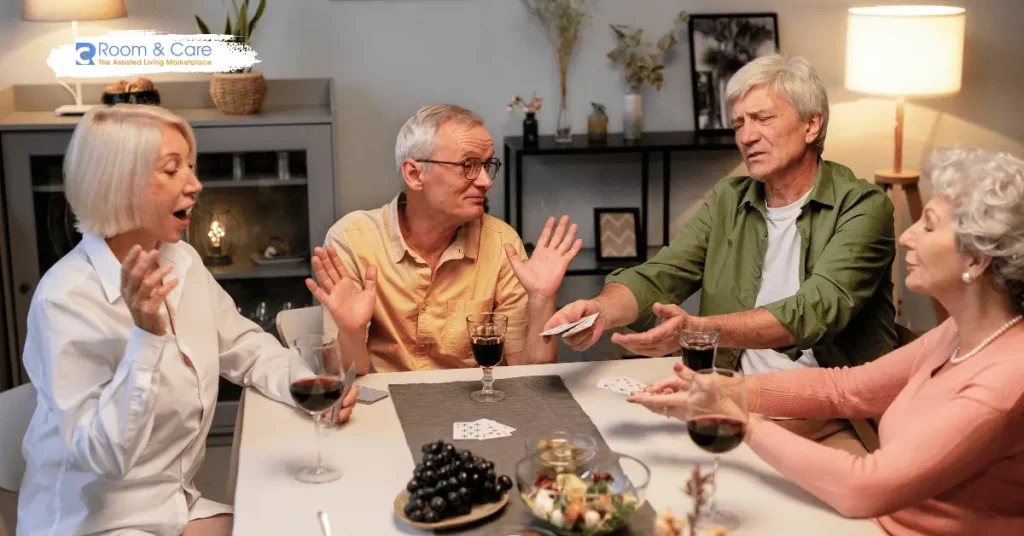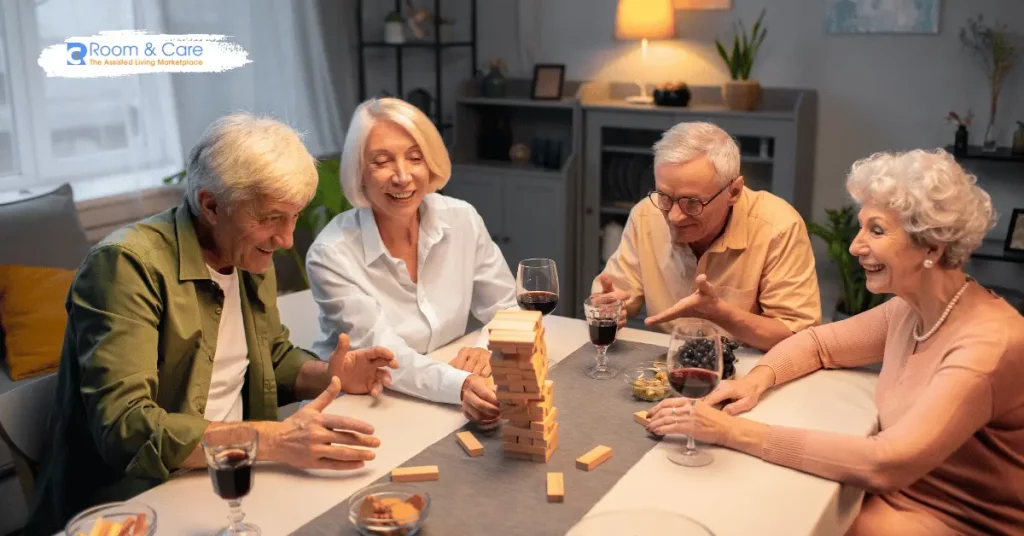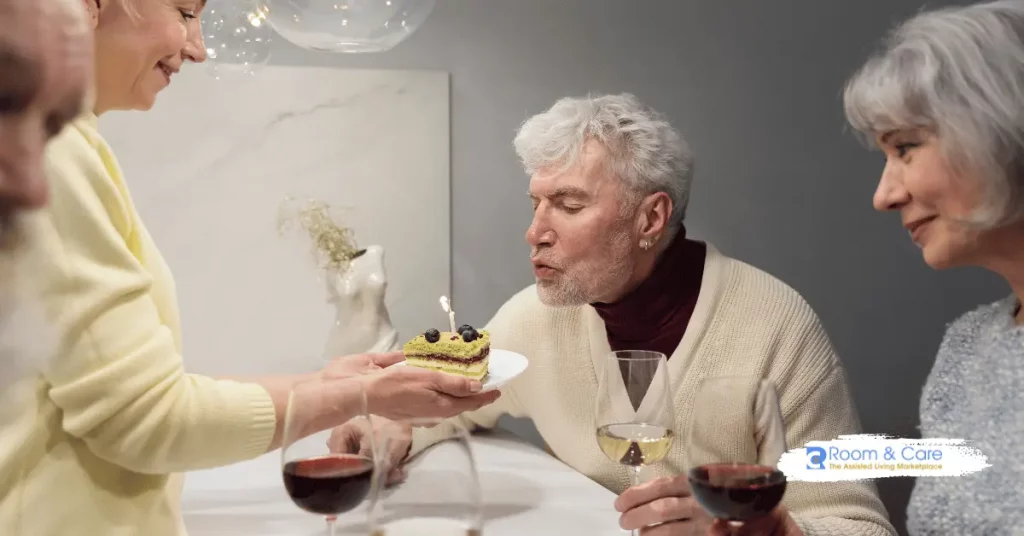

Aging brings numerous changes to a person’s life, many of which can impact their physical and mental health. One aspect that is often overlooked, but is vital for the overall well-being of seniors, is socialization. As people age, their social needs evolve, making it essential to maintain strong social ties and stay connected with others. The social needs of elderly individuals are just as critical as their physical needs, and fulfilling these needs can greatly improve their quality of life. For seniors, especially those in independent living facilities, adult family homes, assisted living communities, and memory care centers, meaningful social interactions provide emotional, cognitive, and physical benefits.
In this article, we will explore the social needs of elderly individuals and the benefits of socialization for seniors. We will also delve into how senior living communities are designed to address these needs and offer tips to families and caregivers on how to enhance socialization for their elderly loved ones. Finally, we’ll provide guidance on how to choose the right senior care environment that best supports social engagement.
The social needs of elderly people are not so different from those of younger individuals. However, as seniors enter their later years, their circumstances and ability to socialize may change, which can make meeting these needs more challenging. Many seniors retire, experience the loss of friends and family members, or encounter physical and cognitive impairments that limit their ability to engage in social activities. These changes can lead to feelings of loneliness and isolation if not addressed properly.
Companionship is essential for elderly individuals. It reduces the risk of social isolation and provides emotional support. Whether through friends, family, or caregivers, having regular interactions with others is important for maintaining a sense of belonging. For seniors in independent living communities or adult family homes, companionship is a core element of daily life. Many facilities encourage group activities such as shared meals, game nights, and exercise classes that promote interaction.
Communication plays a significant role in the mental well-being of seniors. Elderly individuals who regularly engage in conversation are less likely to feel lonely or depressed. Talking to others—whether family members, caregivers, or fellow residents—helps seniors stay connected to the world around them. It also provides an outlet to express their thoughts and emotions. Senior living facilities, such as assisted living communities, often have staff trained to initiate and encourage conversations that provide seniors with emotional support.
One of the most vital social needs of elderly individuals is the need to feel part of a community. Being socially integrated helps seniors maintain their identity and feel valued, especially during times of change. Whether living at home or in a senior living community, feeling part of a group can combat feelings of loneliness. Many senior care facilities, such as independent living communities and adult family homes, actively work to foster a sense of belonging through communal activities and social clubs.
Despite the need for socialization, several factors can impact a senior’s ability to engage with others. Understanding these factors can help caregivers and family members take proactive steps to ensure their loved ones remain socially active.
Physical limitations, such as difficulty walking or chronic pain, can prevent seniors from participating in social activities. In cases where seniors struggle with mobility, transportation to social events or group activities can become difficult. Many assisted living facilities and independent living communities recognize this challenge and provide accessible environments and transportation options, ensuring residents can still take part in social gatherings.
Cognitive decline, including conditions like dementia and Alzheimer’s disease, can make it harder for seniors to maintain social connections. Seniors with dementia may struggle to remember people or engage in conversation, leading them to withdraw from social situations. Memory care facilities are specifically designed to address these challenges by offering structured activities tailored to the cognitive abilities of their residents. These activities help keep seniors engaged, improve their memory, and encourage interaction with others.
Living far from family members can lead to feelings of isolation for elderly individuals. Even if a senior lives at home, infrequent visits from loved ones may result in loneliness. Senior living communities help bridge this gap by providing a built-in social network, where seniors can interact with peers daily. Additionally, technology has made it easier for seniors to stay connected with family through video calls and social media, which can be a valuable tool in maintaining social ties despite physical distance.
Hearing and vision impairments can limit a senior’s ability to participate in conversations and group activities, making it harder to stay socially engaged. Seniors who struggle with these issues may feel self-conscious or frustrated, which can lead them to avoid social settings. Many assisted living communities and independent living facilities offer accommodations for individuals with sensory impairments, such as hearing aids and visual aids, to ensure they can still enjoy the benefits of socialization.

The benefits of socialization for seniors go far beyond mere enjoyment. Staying socially active can improve mental, emotional, and physical health, leading to a longer and more fulfilling life. Here are some of the key benefits that socialization provides for elderly individuals.
Reduced Risk of Depression and Anxiety: Loneliness and social isolation are major risk factors for depression and anxiety among seniors. Engaging in social activities helps alleviate these feelings by providing a sense of purpose and belonging. Studies show that seniors who are socially active are less likely to experience depression compared to those who are isolated.
Cognitive Stimulation and Memory Preservation: Regular social interaction stimulates the brain, which can help seniors maintain cognitive function as they age. Engaging in conversations and activities that challenge the mind can delay the onset of dementia and Alzheimer’s disease. Memory care facilities often incorporate activities that promote cognitive engagement, such as puzzles, music therapy, and group discussions.
Improved Physical Health and Mobility: Seniors who participate in group activities are more likely to stay physically active. Whether it’s participating in a fitness class, going for group walks, or dancing at social events, physical activity is encouraged through social interaction. This not only improves mobility but also reduces the risk of chronic conditions such as heart disease, diabetes, and arthritis.
Stronger Immune System: Socially active seniors tend to have stronger immune systems, which helps them fight off illness and recover more quickly from injuries or surgeries. Regular social interaction can reduce stress and lower cortisol levels, which boosts the immune system’s ability to function properly.
Increased Longevity: Research shows that seniors who maintain strong social connections tend to live longer. A study from Brigham Young University found that individuals with robust social networks had a 50% higher chance of survival over time compared to those who were socially isolated. This demonstrates the profound impact that socialization can have on physical health and longevity.
Enhanced Sense of Purpose: Seniors who are socially active often feel a stronger sense of purpose and fulfillment. Whether through volunteer work, mentoring, or participating in community activities, social engagement helps seniors feel valued and contributes to their overall emotional well-being.
Increased Self-Esteem: Positive social interactions can improve seniors’ confidence and self-esteem. Social engagement provides affirmation that they are important and valued members of their community, which helps combat feelings of worthlessness or loneliness.
Emotional Support During Challenging Times: Social connections provide emotional support during difficult periods, such as the loss of a spouse or health-related challenges. Whether it’s leaning on a friend or participating in a support group, socialization provides seniors with an outlet to express their feelings and receive comfort from others.
Senior living communities, including independent living facilities, assisted living facilities, adult family homes, and memory care centers, are designed to meet the social needs of elderly individuals. These environments provide structured opportunities for seniors to interact with others and engage in meaningful activities, which enhances their overall quality of life.
Independent living facilities are ideal for seniors who are largely self-sufficient but want the benefits of living in a social community. These facilities offer a variety of group activities and events that encourage interaction among residents. From fitness classes and hobby groups to communal dining and social clubs, independent living communities provide ample opportunities for seniors to build friendships and stay socially engaged.
For seniors who need help with daily activities, assisted living facilities provide both the personal care they require and a vibrant social environment. These communities often have dedicated staff members who organize social events, outings, and group activities that cater to residents’ interests and abilities. Regular interaction with caregivers and fellow residents helps meet the social needs of elderly individuals while ensuring they receive the assistance they need.
Adult family homes offer a more intimate and personal setting, often accommodating fewer residents than larger facilities. This allows for closer relationships between residents and caregivers, fostering a strong sense of community and belonging. Socialization in adult family homes may include group meals, movie nights, or outdoor activities, all of which encourage interaction among residents.
Memory care facilities are specifically designed to meet the unique needs of seniors with Alzheimer’s disease and dementia. These communities offer specialized activities that stimulate memory and cognitive function while promoting social engagement. Group activities such as reminiscence therapy, music sessions, and art classes help residents stay connected and socially active despite cognitive decline.
Families and caregivers play a crucial role in helping elderly individuals stay socially active. Here are some practical tips to promote socialization for seniors:
Encourage Participation in Group Activities: Encourage your loved one to join social clubs, fitness classes, or volunteer groups that align with their interests. Senior living communities often offer a wide variety of group activities that cater to different preferences.
Use Technology to Stay Connected: For seniors who live far from family, technology can help bridge the gap. Teach your loved one how to use video call platforms like Zoom or FaceTime, and encourage regular virtual meetings with family and friends.
Plan Regular Visits: If your loved one lives in a senior living facility, plan regular visits to provide emotional support and maintain a close connection. Even short, frequent visits can make a significant difference in combating loneliness.
Encourage Volunteering or Mentoring: Many seniors find fulfillment in giving back to their communities through volunteering or mentoring younger generations. Help your loved one find volunteer opportunities that match their skills and interests.
Visit Senior Living Communities: If you’re considering moving your loved one to a senior living facility, visit several options and inquire about their social programs. Facilities that prioritize social engagement will often have a calendar full of events and activities for residents.

Senior living communities offer structured activities and events designed to promote interaction among residents. These activities, which may include fitness classes, hobby groups, and social clubs, provide seniors with regular opportunities to engage with others.
Families can encourage seniors to participate in group activities, use technology to stay connected, and plan regular visits to provide emotional support. It’s also important to choose senior living facilities that prioritize socialization and offer a variety of activities.
Yes, assisted living facilities are excellent for seniors who need personal care but still want to maintain an active social life. These communities have staff dedicated to organizing events, outings, and group activities that help residents stay connected.
Memory care facilities offer specialized activities designed to stimulate cognitive function and promote social interaction. Group activities such as music therapy, reminiscence therapy, and art classes are often used to help residents engage socially and mentally.
The social needs of elderly individuals are critical to their overall well-being and quality of life. Socialization offers numerous mental, emotional, and physical benefits, including reduced risk of depression, improved cognitive function, and increased longevity. Senior living communities, such as independent living facilities, assisted living facilities, adult family homes, and memory care centers, provide structured environments where seniors can build meaningful connections and engage in regular social activities.
At Room and Care, we understand the importance of social engagement for seniors. Our platform connects families with the best senior living options, including assisted living facilities, memory care centers, adult family homes, and independent living communities—all without referral fees or middlemen.